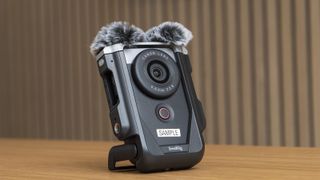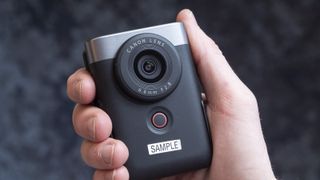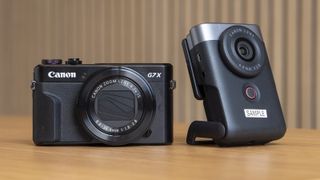Vlogging cameras have boomed in recent years, with Sony pushing the concept, and the likes of Panasonic and Nikon throwing their hats into the ring. Now Canon has entered the market with a totally different offering, the Canon Powershot V10.
It’s packing what is essentially the same 1-inch sensor as in the Canon Powershot G7 X III from 2019, with 4K/30p and Full HD 60p video recording, plus 20MP JPEG images. But that’s where the similarities end – as indeed do comparisons with most ‘regular’ cameras. What we have here is a unique design concept that will polarize opinion, but one that is unashamedly a vlogging camera.
Having had some brief hands-on time with the Canon Powershot V10, I’ve found there’s a lot that makes sense in terms of how it operates. It’s a stripped-back and simple experience – this is a camera that’s meant to be ready at the push of a button to make vlog content. Let’s unpack the highlights of the cutesy V10.
Price and availability
The Canon Powershot V10 is available from June 2023, priced at $399 / £429 / AU$699 for the vlogging kit which includes a rubber lens cap made by SmallRig, and magnetic windshields for the stereo mics on the top of the camera.
In Europe only there’s also an advanced vlogging kit, which additionally includes a SmallRig cage, priced at £459. We were told that this was the first time Canon had partnered with the accessories maker ahead of a product launch to produce suitable accessories.
A new concept
Sony dominates our best vlogging cameras guide, and recently it upped the ante with the full-frame Sony ZV-E1 – a camera that’s overkill for most people, but which inadvertently became the cheapest way to get Sony’s best full-frame sensor for 4K video.
Most vlogging cameras in our buying guide pack the latest tech and feature the likes of a vari-angle screen, tally lamp and multi-directional built-in stereo mics to make life easier for vlogging, but also work as regular cameras too. The V10 does things a little differently, and goes all-in on vlogging. This is not a camera that’s designed to double up for stills photography, though it does shoot 20MP JPEG-only images.
No, the concept here is small and pocketable. The V10 fits in the palm of your hand, and is quick to set up for hands-free video, with a built-in fold-out stand. No messing around with a tripod, or precariously balancing your camera to capture the spur of the moment. Recording is initialized using the big fat button.
The menus are stripped back; in fact, you wont need to delve into the menu because the 2-inch flip-up touchscreen includes a short cut for four video record modes that cover most situations, including stabilized video.
The ultra-wide fixed 18mm lens (19mm for photography) is a sensible focal length choice, because the V10 is made to be held at arm’s length, or placed beside you on its stand while you go about sharing your content. Ultra-wide also gives you the extra room in the frame, which is helpful given the small crop when digital image stabilization is employed for run-and-gun videos.
There are two large stereo omnidirectional mics, a 3.5mm stereo jack, and an auto wind filter. Wireless Live streaming to Youtube and Facebook is promised to be a relatively headache-free process via Canon’s app, or the BR-E1 remote.
We’re not talking groundbreaking tech in the V10, but it does tick a lot of the practical boxes.
Initial reaction
There’s no getting away from the fact that the tech in the Powershot V10 is dated, as in at least four years old, going back to the Powershot G7 X III; it even records to microSD card, with no internal memory. And it isn’t cheap considering that the tech inside has essentially been recycled. But there is something a little charming about the V10, plus I like how it’s purpose-built for the job, and easy to use.
You can find out more about the V10 in our upcoming hands-on review.
Source: www.techradar.com













